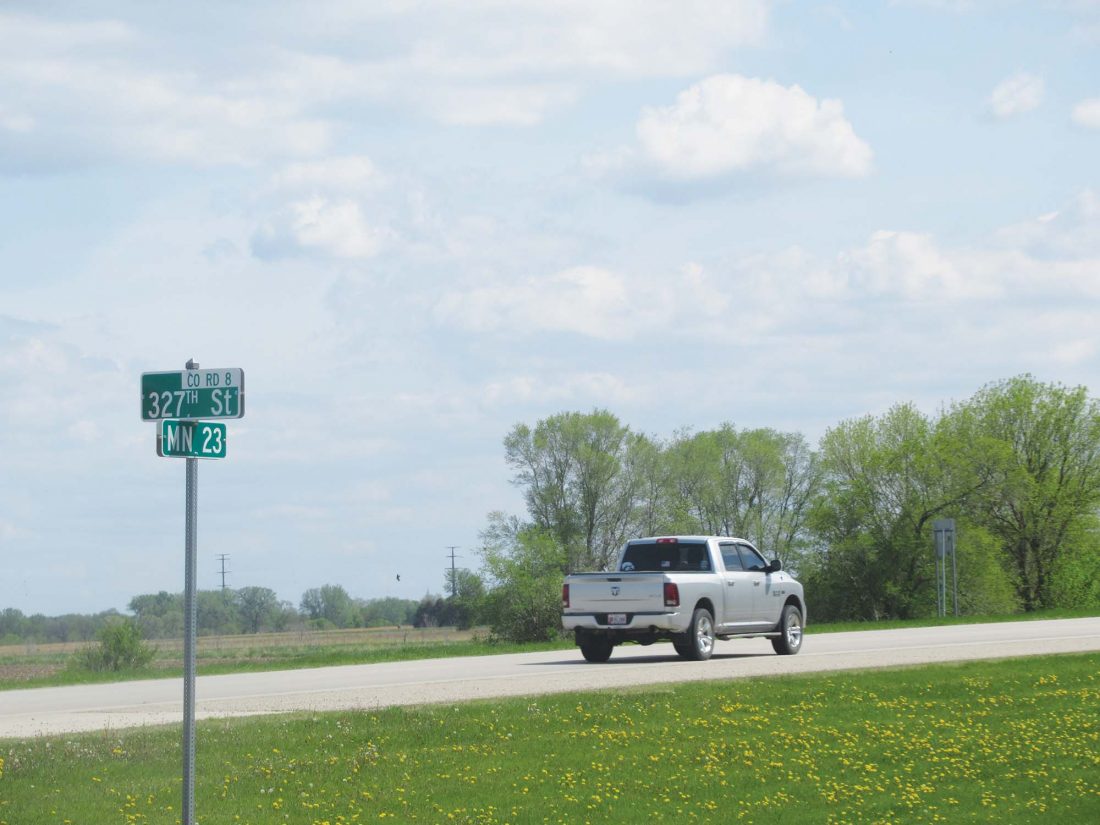Making their case
As national legislators discuss infrastructure spending, Highway 23 advocates turn to Rep. Michelle Fischbach

Photo by Deb Gau Expansion of Minnesota Highway 23 to four lanes between Marshall and Green Valley is one of this year’s priority projects for the Highway 23 Coalition. One of the advocacy group’s main goals is to fill in gaps of two-lane road along the Highway 23 corridor.
MARSHALL — The past year threw plenty of challenges to advocates for improving the Minnesota Highway 23 corridor, but members of the Highway 23 Coalition said they didn’t stop working. And as federal lawmakers are forming infrastructure spending proposals, Coalition members are turning their efforts to advocacy at the national level.
Members of the Highway 23 Coalition shared some of their concerns about transportation and infrastructure funding with U.S. Rep. Michelle Fischbach and her staff last week, during the Coalition’s annual meeting. Fischbach weighed in on proposed federal infrastructure spending, particularly the $2.3 trillion infrastructure plan proposed by President Joe Biden.
“I’m very concerned about that, because I don’t think he puts enough money into roads and bridges,” Fischbach said.
The Highway 23 Coalition, a group that advocates for improvements to the Highway 23 corridor in Minnesota, including expansion of the highway to four lanes, held its annual meeting over Zoom on Friday.
In spite of the COVID-19 pandemic, “We have not stopped working on your behalf,” said Coalition Board Chairwoman Donna Boonstra.
Boonstra said the Coalition has several priority projects that it is continuing to support this year, including extending the four-lane roadway on Highway 23 north from Marshall to Green Valley. The project would extend the four-lane highway for about 4.5 miles.
“This project would make the transition from rural to city traffic safer, including truck traffic approaches to the (Lyon) County Road 33 turnoff. It may also stimulate commercial development along the east side of Highway 23,” said David Sturrock of the Marshall Area Transportation Group. Sturrock was one of around 50 people attending the Coalition annual meeting remotely.
The Highway 23 Coalition’s other priority projects include a feasibility study on expanding Highway 23 to four lanes between Foley and Milaca, construction of an overpass that would connect to the new interchange at Highway 23 and County Road 5 in Willmar, and construction of a J-turn in the city of Waite Park at the intersection of Highway 23 and Bel Clare Drive. Design work is also continuing to fill gaps in the four-lane corridor between Willmar and I-94.
Finding funding to maintain roads and bridges in greater Minnesota can be a challenge, Sturrock told the Independent. Advocacy groups like the Highway 23 Coalition have to use different strategies to support rural roads.
“Rural highways always struggle for funding because of lower traffic counts,” he said. “Supporters of such projects instead emphasize safety considerations, especially since those roads have more accidents and deaths per mile traveled. Economic development and regional connectivity are also crucial arguments.”
The good news for advocates like the Highway 23 Coalition is that both Minnesota and federal transportation programs include funding that’s meant to address safety, economic and connection needs, Sturrock said.
So far, the Coalition has focused lobbying efforts on Minnesota’s state legislature and the Minnesota Department of Transportation, Sturrock said. The state’s Corridors of Commerce program is a good fit for the Coalition’s goals, he said.
“Legislators along the Highway 23 corridor have been strong supporters of these projects because they understand what they mean for safety, connectivity and economic development in our region,” he said. “However, the Coalition’s federal efforts have become more important because of renewed attention in Washington on infrastructure, plus the expected return of community directed initiatives, or earmarking.”
While Fischbach was only able to speak to the Highway 23 Coalition briefly on Friday, her legislative director Nick Lunneborg took questions and heard concerns from Coalition members. Lunneborg said Fischbach had “significant concerns” about how the Biden proposal had a smaller proportion of spending for roads, bridges and railways. A counterproposal on infrastructure spending from Republican senators would include about $300 billion for infrastructure like roads and bridges, Lunneborg said.
Lunneborg also said Fischbach supported rural broadband expansion and biofuels, joining the Congressional Biofuels Caucus.




